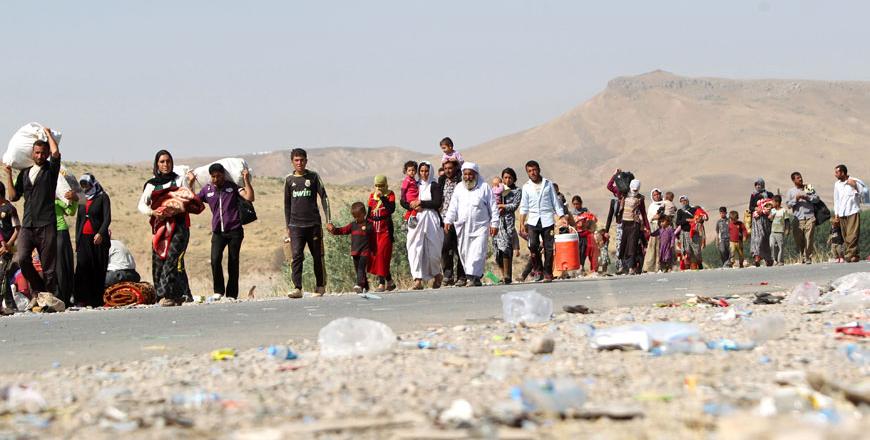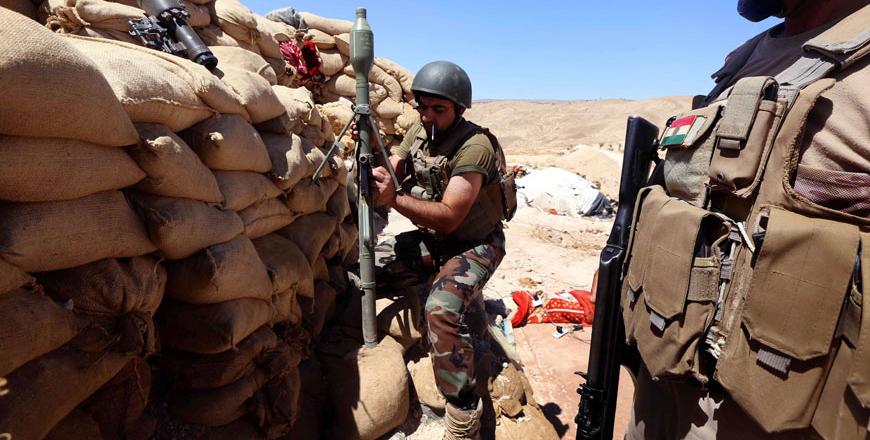You are here
Iraqi Kurdish leader vows to avenge Yazidis
By AFP - Aug 03,2015 - Last updated at Aug 03,2015

A file picture taken on August 13, 2014, shows displaced Iraqi families from the Yazidi community crossing the Iraqi-Syrian border at the Fishkhabur crossing, in northern Iraq. One year since the brutal onslaught of the Yazidi community by Daesh militants in the Sinjar area, the president of Iraq’s autonomous region of Kurdistan, Massoud Barzani, promised to avenge the attack (AFP photo)
DOHUK, Iraq — The president of Iraq's autonomous region of Kurdistan, Massoud Barzani, promised Monday to avenge the Yazidi minority brutally attacked by the Daesh terror group a year ago.
"We will hunt down those who committed this crime until the last one," Barzani said in Dohuk at a ceremony commemorating the beginning of the jihadist onslaught against the Yazidis.
A Kurdish-speaking minority mostly based around the Sinjar mountain in northern Iraq, the Yazidis are neither Arabs nor Muslims and have a unique faith which Daesh considers to be polytheism.
Exactly a year ago, the jihadists made an unexpected push into areas of northern Iraq that had been under Kurdish control and were home to many of the country's minorities.
The worst-hit were the Yazidis, who were massacred and abducted in large numbers when Daesh entered the Sinjar area.
Tens of thousands of them scrambled up Mount Sinjar in a panic and remained stranded there for days with no food or water in searing summer temperatures.
Dramatic footage of their flight through Syria and back into autonomous Iraqi Kurdistan caught the world's attention.
The jihadist onslaught against the Yazidis has been described by the United Nations as "an attempt to commit genocide" and was one of the main justifications for the US-led air campaign against Daesh that began days later.
Backed by the international coalition that subsequently developed, the Kurdish peshmerga as well as Kurdish forces from neighbouring Syria have clawed back land, but not all of it.
"They [Daesh] have left thousands of bodies on the battlefield, but this is not enough in comparison with the crimes they committed," Barzani said.
The Kurdistan Regional Government (KRG) released figures on the Yazidis saying that the community counts 550,000 members in Iraq.
New province
The figures said Yazidis account for 400,000 of the more than three million people who have been displaced in Iraq since violence erupted at the beginning of 2014.
According to KRG figures, 1,280 Yazidis were killed in the Daesh offensive, 280 died due to the conditions they were subjected to and 841 are still missing.
More than 5,800 were also abducted by Daesh, which has used Yazidi girls and women as slaves. Just over 2,000 of them have managed to flee, the KRG said.
Kurdish and Yazidi forces have retaken control of Mount Sinjar but the battle is still going on in the city of Sinjar, which lies at the foot of the mountain on the southern side.
“Half of Sinjar and its outskirts still aren’t liberated,” Barzani said in Dohuk, which is the main city in western Kurdistan and where many displaced Yazidis are settled.
“We cannot stop until we liberate all of our land from the hands of the enemy and ensure the return of the displaced,” said Barzani.
The factions battling Daesh in Sinjar are peshmerga forces dominated by Barzani’s Kurdistan Democratic Party (KDP) and Syrian Kurds from the PYD, considered an affiliate of the Turkish Kurdish PKK group.
The KDP and PKK have long been rivals and the peshmerga have strived to counter a perception that it was the PYD that rescued the Yazidis from Mount Sinjar.
“We have given more than 1,000 martyrs to attach Sinjar to Kurdistan,” Barzani said.
“I demanded the KRG establish a special administration in this area and I will demand the Iraqi government to make Sinjar the centre of the province,” he said.
Sinjar lies near the Syrian border and is not within the recognised borders of the three-province Kurdistan Regional Government.
The first major Daesh push in June 2014 saw Iraq’s federal army collapse and abandon their positions. The peshmerga filled the vacuum and de facto expanded the KRG by around 40 per cent.
Related Articles
ERBIL, Iraq — Kurdish forces are massing in northwest Iraq for an offensive to retake the town of Sinjar from Daesh militants who overran it
SINJAR, Iraq — Militants occupying the Iraqi town of Sinjar are so close that Kurdish fighters can watch them without binoculars and battles
Kurdish peshmerga fighters have secured a route to Iraq's Sinjar mountain, where hundreds of people had been trapped by the Islamic State (IS) fighters, Masrour Barzani, head of the Iraqi Kurdish region's national security council said on Thursday.












